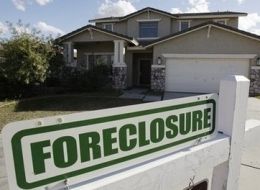WASHINGTON (AP/HuffPost)-- The Obama administration, battling a foreclosure crisis that shows no signs of relenting, will step up pressure on mortgage companies to do more to help people remain in their homes, officials said Saturday.
The administration will announce its expanded program on Monday, Treasury spokeswoman Meg Reilly said.
"We are taking additional steps to enhance servicer transparency and accountability," Reilly said. She said the goal was to increase the rate that troubled home loans were converted into new loans with lower monthly payments.
So far, the program's numbers have been lackluster. When the administration rolled out the program, called Making Home Affordable, it hoped to save 3-4 million homeowners from foreclosure. The New York Times interviews a former Fannie Mae official who says that currently, the program will be lucky if it can save 1.5 million Americans from foreclosure.
According to Realtytrac, 2,631,158 foreclosure filings were reported in the first three fiscal quarters of 2009. Realtytrac expects that nationwide, 3.2-3.4 million properties will go into foreclosure in 2009, up from 2.3 million in 2008. About 10 percent of residential households nationwide, or about five million, were behind by at least one mortgage payment in the third quarter. Almost 4.5 percent of residential properties were in some form of foreclosure.
The New York Times reports on the program:
Last month, an oversight panel created by Congress reported that fewer than 2,000 of the 500,000 loan modifications then in progress had become permanent under Making Home Affordable. When the Treasury releases new numbers next month, it is expected to report a disappointingly small number of permanent loan modifications, with estimates in the tens of thousands out of the more than 650,000 borrowers now in the program.
More unsatisfactory data is likely to intensify pressures on the Obama administration to mount a more muscular effort to stem foreclosures beyond the Treasury's campaign this week. Populist anger has been fanned by a growing perception that the Treasury has lavished generous bailouts on Wall Street institutions while neglecting ordinary homeowners -- this, in the midst of double-digit unemployment, which is daily sending more households into delinquency.
Industry officials said the new effort would include increased pressure on mortgage companies to accelerate loan modifications by highlighting firms that are lagging in that area.
The Treasury is also expected to announce that it will wait until the loan modifications are permanent before paying cash incentives to mortgage companies that lower loan payments.
Under the $75 billion Treasury program, companies that agree to lower payments for troubled borrowers collect $1,000 initially from the government for each loan, followed by $1,000 annually for up to three years.
The government support, which is provided from the $700 billion financial bailout program, is aimed at providing cash incentives for mortgage providers to accept smaller mortgage payments rather than foreclosing on homes.
The program has come under heavy criticism for failing to do enough to attack a tidal wave of foreclosures. Analysts said the foreclosure crisis is likely to persist well into next year as high unemployment pushes more people out of their homes.
Rising foreclosures depress home prices and threaten the sustainability of the fledgling economic recovery.

The Congressional Oversight Panel, a committee that monitors spending under Treasury's bailout program, concluded in a report last month that foreclosures are now threatening families who took out conventional, fixed-rate mortgages and put down payments of 10 to 20 percent on homes that would have been within their means in a normal market.
Treasury's program, known as the Home Affordable Modification Program, "is targeted at the housing crisis as it existed six months ago, rather than as it exists right now," the report said.
Scott Talbott, senior vice president of government affairs for the Financial Services Roundtable, said the industry supported many of the changes Treasury was proposing.
But he said the foreclosure problem, which began with heavy defaults on subprime mortgages, was expanding to more traditional types of mortgages because of unemployment which has now hit a 26-year high of 10.2 percent.
"The subprime problem has regrettably morphed into an unemployment problem," Talbott said. He said there was no government program to help the unemployed who are in danger of losing their homes but "many private lenders are modifying loans for the unemployed on their own."
Treasury's Reilly said the expanded program would, among other steps, make more aid available to struggling borrowers and expand the number of organizations providing help.
___
Associated Press writer Jim Kuhnhenn contributed to this report.






No comments:
Post a Comment